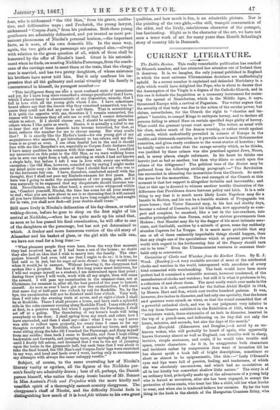CURRENT LITERATURE.
The Dublin Review. This really remarkable publication has reached its fifteenth number, and has attracted less attention out of Ireland than it deserves. It is, we imagine, the only journal published in England in which the most extreme Ultramontane doctrines are unflinchingly upheld. In a recent number it explained and defended Mariolatry in a style which would have delighted the Pope, who is about to decree that the Assumption of the Virgin is a dogma of the Catholic Church, and in this one it defends the Inquisition as a necessary instrument for resist- ing the spread of Manichaeism, which in the Middle Ages, it says, threatened Europe with a revival of Paganism. The writer argues that the severity of that body was due to the action of the secular power, but claims, nevertheless, for the Church the right to "chastise and im- prison" heretics, to compel Sings to extirpate heresy, and to declare all persons failing to attend Mass on certain specified days guilty of heresy. What could the greatest tyrant want more ? The writer, as usual with his class, makes much of the demon worship, or rather revolt against all creeds, which undoubtedly prevailed in corners of Europe in the twelfth and thirteenth centuries, as it prevails now in most Mohammedan countries, and gives ready credence to the worst stories of heretics ; but he totally omits to notice that the savage severity which, as he thinks, was justified by these crimes was also 'practised against Jews, Moors, and, in many places, simple reformers. In his heart he thinks one heretic just as bad as another, but then why dilate so much upon the crimes of the Albigenses? The political tone of the Review may be gathered from the following striking paragraph :—" The Revolution has succeeded in alienating the monarchies from the Church. So much the worse for the monarchies. The real strength of the Church at this moment is that her support is altogether invisible and inscrutable; and that so this age is doomed to witness another terrific illustration of the difference that Providence draws between policy and faith. It is a safe thing to say that it is much more likely Louis Napoleon may die a lunatic in Bic8tre, and his son be a humble student of Propaganda ten years hence ; that Victor Emanuel may, in his last sad shabby days, become a colonel of Cossacks, and his kingdom, now apparently so com- pact and complete, be smashed, like a nut in the nut-crackers, into smaller principalities than Parma, ruled by stricter governments than Modena ; that Mazzini may die by the dagger of his most intimate asso- ciate, and Garibaldi, smitten by a miracle of grace, some day suddenly abandon Caprera for La Trappe. It is much more probable that any one or all of these eminently improbable things should happen, than that any single one of the speculations which at present prevail in the world with regard to the forthcoming fate of the Papacy should turn out to be true." Even the Ultramontaniat ventures to sentence Gari- baldi only to conversion.






























 Previous page
Previous page